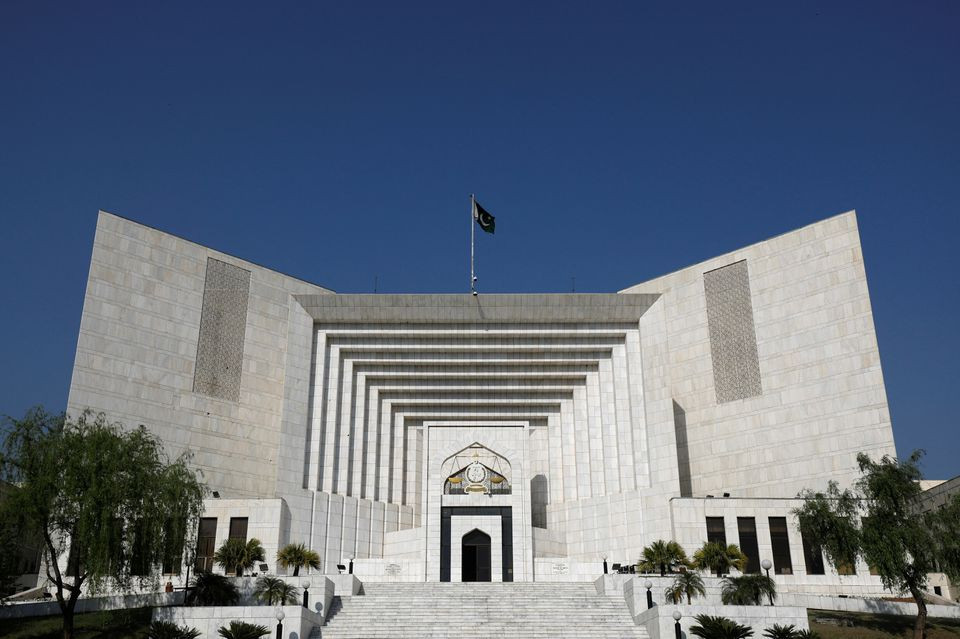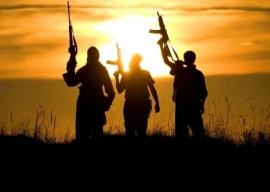
The Supreme Court has lamented the constitutional transgressions that have taken place in the country over the years.
It has also ruled that the general elections must be held when they “are due” in the wake of the delay in conducting the polls within the 90-day constitutional limit after the premature dissolution of the assemblies.
"Pakistan was established democratically, is a democracy, and must remain one. When general elections are due, they have to be held,” read a 10-page judgment authored by Chief Justice of Pakistan Qazi Faez Isa on the petitions filed by the Supreme Court Bar Association (SCBA) and PTI for holding the general polls within 90 days.
The judgment was issued on Friday.
“We are humbled in facilitating the president and the ECP (Election Commission of Pakistan) to do right by the people of Pakistan,” it added.
On Thursday, the ECP and President Dr Arif Alvi agreed that general elections in the country would be held on Feb 8 following CJP Isa’s directives to the electoral body earlier that day to confer with him on the polls date.
The ECP also issued a notification on Friday, which stated that Feb 8, 2024 was the date for the general elections to the National Assembly and the provincial legislatures.
"Since the election[s] date was not announced, concerns were rising amongst the people of Pakistan, where many of them apprehended that elections may be indefinitely postponed or not take place, which undoubtedly would cause irreparable damage to democracy and the country,” the verdict read.
“Conscious of the Supreme Court’s lack of jurisdiction and careful not [to] trespass on the jurisdiction of the president and of the ECP, we encouraged them to meet and determine that which was within their constitutional domain. They met yesterday (November 2, 2023) and the meeting proved to be a success," it added.
The court in its judgment noted that on April 3, 2022, the president had dissolved the National Assembly by using a power not vested in him. It continued that in the present case, the president had not used a power, which he did possess.
“Constitutional office holders must adhere to the Constitution; fulfil the duties assigned to them as a sacred trust, and divest themselves from all that is outside their constitutional domain; only then do they serve the people of Pakistan,” the verdict read.
The SC pointed out that the president had earlier dissolved the National Assembly when the prime minister faced a vote of no confidence.
“Despite the fact that the Constitution clearly mandated that once the requisite number of members had given a notice of a resolution for a vote of no confidence in the National Assembly, the power to advise [the] dissolution of the National Assembly no longer remained with the prime minister. Therefore, the president could not dissolve the National Assembly. But the Constitution was disregarded, triggering a constitutional crisis, which then had to be redressed by this court, in the case reported as Pakistan People’s Party Parliamentarians v Federation of Pakistan,” it continued.
The verdict read that it was pointed out by the previous CJP and four SC judges – what was “manifestly clear” –that a prime minister facing a vote of no confidence could not advise the dissolution of the NA.
“The purported dissolution of the National Assembly was declared unconstitutional and held to be of no legal effect,” it added.
The judgment also pointed out that one of the SC judges had expressed his views that there should be consequences for such a blatant transgression of the Constitution.
The verdict noted that the higher the constitutional office or body, the greater was the responsibility.
"Obedience to the Constitution and law is an inviolable obligation of every citizen, however, an added responsibility and obligation is placed on all those who have assumed their office by taking an oath,” it stated.
The top court highlighted that the president took the prescribed oath and so did the chief election commissioner as well as the members of the ECP.
“The Constitution has subsisted for 50 years; there is no longer any excuse to remain ignorant of the Constitution. Incidentally, on this very day (November 3, 2007) a grave constitutional transgression took place 16 years ago, and like it every constitutional deviation has long-lasting effects,” the judgment read, referring to the late military ruler, Gen (retd) Pervez Musharraf, declaring a state of emergency and suspending the Constitution.
"We must abide by the Constitution and realise [the] mistakes which have had a calamitous effect on the people and the territory of Pakistan,” it added.
The SC noted that it was about time that the courts ceased to be involved in political disputes.
It added that political disputes took up considerable amount of the courts’ time, which would be better spent on carrying out the functions that they were required to perform.
Acknowledging the role of the media, the order noted that Article 19 of the Constitution had decreed that “there shall be freedom of the press”, subject to the stated reasonable restrictions.
"But some have construed this freedom as a [licence] to [spread disinformation] and build a false narrative, and do so to undermine democracy. The Pakistan Electronic Media Regulatory Authority (Pemra) prohibits content which incites or condones dislodgment of [the] democratic set-up against the command of the Constitution of Pakistan, provided that discussions on improvement of democracy shall constitute a fair comment,” the order pointed out.
The court highlighted that a decreased confidence in democracy diminished the people’s engagement with it and suppressed the turnout of voters.
“However, this court appreciates those in the media who perform their duties professionally and truthfully," the judgment added.

1719660634-1/BeFunky-collage-nicole-(1)1719660634-1-405x300.webp)

1732276540-0/kim-(10)1732276540-0-165x106.webp)

1732274008-0/Ariana-Grande-and-Kristin-Chenoweth-(1)1732274008-0-165x106.webp)


1724249382-0/Untitled-(640-x-480-px)1724249382-0-270x192.webp)


1732270499-0/Express-Tribune-(7)1732270499-0-270x192.webp)






COMMENTS
Comments are moderated and generally will be posted if they are on-topic and not abusive.
For more information, please see our Comments FAQ